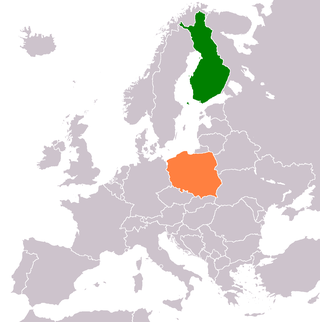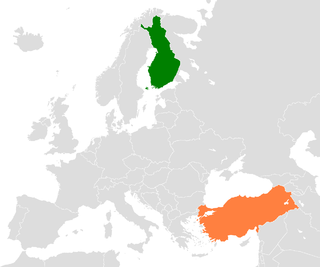The foreign relations of Croatia is primarily formulated and executed via its government which guides the state's interactions with other nations, their citizens, and foreign organizations. Active in global affairs since the 9th century, modern Croatian diplomacy is considered to have formed following their independence from Yugoslavia in 1991. As an independent state, Croatia established diplomatic relations with most world nations – 187 states in total – during the 1990s, starting with Germany (1991) and ending most recently with Togo (2023). Croatia has friendly relations with most of its neighboring countries, namely Slovenia, Hungary, Montenegro, and Italy. They maintain colder, more tense relations with Serbia as well as Bosnia and Herzegovina due to historic nation-building conflict and differing political ideologies.
The Republic of Estonia gained its independence from the Russian Empire on 24 February 1918 and established diplomatic relations with many countries via membership of the League of Nations. The forcible incorporation of Estonia into the Soviet Union in 1940 was not generally recognised by the international community and the Estonian diplomatic service continued to operate in some countries. Following the restoration of independence from the Soviet Union, Russia was one of the first nations to re-recognize Estonia's independence. Estonia's immediate priority after regaining its independence was the withdrawal of Russian forces from Estonian territory. In August 1994, this was completed. However, relations with Moscow have remained strained primarily because Russia decided not to ratify the border treaty it had signed with Estonia in 1999.

The foreign relations of Finland are the responsibility of the president of Finland, who leads foreign policy in cooperation with the government. Implicitly the government is responsible for internal policy and decision making in the European Union. Within the government, preparative discussions are conducted in the government committee of foreign and security policy, which includes the Prime Minister and at least the Minister of Foreign Affairs and the Minister of Defence, and at most four other ministers as necessary. The committee meets with the President as necessary. Laws concerning foreign relations are discussed in the parliamentary committee of foreign relations. The Ministry of Foreign Affairs implements the foreign policy.

Croatia and Greece established diplomatic relations on July 20, 1992. Since November 1994, Greece has an embassy in Zagreb. Croatia has an embassy in Athens. The relations between Croatia and Greece have been regarded as excellent with a high cooperation between the two countries on the economic, touristic and political aspect. Greece was a key supporter during the accession process of Croatia to the European Union. Both countries are full members of the European Union, NATO and of the Council of Europe.

Finnish-Greek relations are foreign relations between Finland and Greece. Greece was among the first countries to recognize the independence of Finland, on January 5, 1918. Both countries established diplomatic relations in 1920. Since February 1, 1977, Finland has had an embassy in Athens. For a long period Finland was represented in Greece through its embassies either in Bucharest, Rome or Belgrade. Finland also has 7 honorary consulates in Kos, Patras, Pireus, Rhodes, Thessaloniki, Heraklion, and Corfu. Greece has an embassy in Helsinki and 4 honorary consulates in Turku, Kuopio, Oulu, and Rovaniemi.

Before 1918, both Finland and Ukraine were part of the Russian Empire. In 1918, Finland was one of the first countries to recognise Ukraine and open a diplomatic mission in Kyiv. Finland once again recognised Ukraine on December 30, 1991. Both countries established diplomatic relations on February 26, 1992. Finland is a member of the European Union, which Ukraine applied for in 2022. Both countries are full members of Council of Europe.

Finnish-Serbian relations are foreign relations between Finland and Serbia. Both countries established diplomatic relations in 1929. Finland has an embassy in Belgrade. Serbia has an embassy in Helsinki. Both countries are full members of the Council of Europe. Also Finland is an EU member and Serbia is an EU candidate. Finland supports Serbia's European Union membership.

Finland–Poland relations refer to bilateral relations of Finland and Poland. Both countries are members of the European Union, NATO, OECD, OSCE, Council of the Baltic Sea States, HELCOM, Council of Europe and the World Trade Organization. Both countries established diplomatic relations on 8 March 1919.

Canadian-Finnish relations are foreign relations between Canada and Finland. Diplomatic relations between them were established on November 21, 1947. Canada has an embassy in Helsinki. Finland has an embassy in Ottawa. There are over 143,000 Canadians with Finnish ancestry and over 2,000 Canadian immigrants living in Finland.

France–Finland relations are foreign relations between France and Finland. France was one of the first countries which recognised Finland's independence on 4 January 1918. Diplomatic relations between them were established on 24 January 1918. Both countries are full members of the European Union. According to a 2005 BBC World Service Poll, 48% of Finns view French influence positively, with 26% expressing a negative view. There are an estimated 7,000 Finns living in France. Both countries are members of the Council of Europe, European Union, NATO, and Eurozone.

Diplomatic relations between the Republic of Albania and the Republic of Croatia were established on August 25, 1992. Albania has an embassy in Zagreb and an honorary consulate in Dubrovnik while Croatia has an embassy in Tirana.

Finland-Italy relations are foreign relations between Finland and Italy. Both countries established diplomatic relations on 6 September 1919. Finland has an embassy in Rome, Italy has an embassy in Helsinki. Both countries are full members of the European Union, NATO, Organization for Security and Co-operation in Europe, Council of Europe and the Eurozone.

Dutch–Finnish relations are foreign relations between the Netherlands and Finland. The Netherlands recognised Finland's independence on 28 January 1918. Diplomatic relations between them were established on 14 August 1918. The Netherlands has an embassy in Helsinki and consulates. Finland has an embassy in the Hague, an honorary consulate general in Amsterdam and other honorary consulates in Rotterdam and Terneuzen. Both countries are full members of the Council of Europe, the European Union and NATO. The Netherlands supported Finland's NATO membership during Finland's accession into NATO, which was finalized on 4 April 2023.

Finland–Spain relations are the diplomatic relations between the Republic of Finland and the Kingdom of Spain. Both nations are members of the Council of Europe, the European Union, the United Nations, the Schengen Area, the eurozone, and NATO. Diplomatic relations between the two countries have traditionally been good and fruitful and, at the same time, have consolidated an exchange at all levels. Spain is also one of the favorite destinations of Finnish tourism. Approximately ten percent of the Finnish population travels on vacation each year to Spain. Furthermore, the Finns are the fastest growing European community in Málaga, as Fuengirola is home to the second largest colony of Finns in the world, after Sweden.

Croatia–Sweden relations are foreign relations between Croatia and Sweden. Both countries established diplomatic relations on 29 January 1992. Croatia has an embassy in Stockholm. Sweden has an embassy in Zagreb and 2 honorary consulates.

Finland–Turkey relations are foreign relations between Finland and Turkey. Finland has an embassy in Ankara and an honorary consulate general in Istanbul and other honorary consulates in Adana, Alanya, Antalya, Belek, Bodrum, İzmir, and Kayseri. Turkey has an embassy in Helsinki. Both countries are full members of the Council of Europe, the Organisation for Economic Co-operation and Development (OECD), the Organization for Security and Co-operation in Europe (OSCE), North Atlantic Treaty Organization (NATO), and the Union for the Mediterranean.

Hungary–Sweden relations are foreign relations between Hungary and Sweden. Sweden has an embassy in Budapest. Diplomatic relations between the two countries started on 28 December 1945. These relations developed to a higher ambassador level. In Stockholm there is a Hungarian embassy. Both countries are members of the Council of Europe, European Union and Organization for Security and Co-operation in Europe.

Finland–Germany relations are the bilateral relations between the Finland and Germany. Both countries are part of the European Union, are signatories of the Schengen Agreement, and are members of the eurozone and NATO. Germany supported Finland's NATO membership during Finland's accession into NATO, which was finalized on 4 April 2023.

Croatia–Denmark relations refers to the current and historical relations between Croatia and Denmark. Relations between the two countries are described as "excellent", "friendly" and "well-developed".

Croatia–North Macedonia relations are foreign relations between Croatia and North Macedonia. Two countries established diplomatic relations on 30 March 1992. Croatia is represented in North Macedonia via its Embassy in Skopje and honorary consul in Strumica while North Macedonia is represented in Croatia via its Embassy and the Cultural and Informational Center in Zagreb as well as consulate in Rijeka and honorary consul in Zadar. Croatia supports North Macedonia's European Union membership. Before their independence in early 1990s, both countries were constituent republics of the Socialist Federal Republic of Yugoslavia as the SR Croatia and SR Macedonia respectively. Croatia was one of the first countries in the world to recognize the independence of the country during the period in which Zagreb itself awaited international recognition. During the long-lasting Macedonia naming dispute (1991-2019) and before the signature of the Prespa agreement Croatia was the first country in the world to recognize North Macedonia under its constitutional name of the Republic of Macedonia instead of appellation "the former Yugoslav Republic of Macedonia". Today, both countries are full members of the Council of Europe, and of the NATO. Croatia is an EU member and North Macedonia is an EU candidate. Since 2006 North Macedonia is a member state of the Central European Free Trade Agreement while Croatia was a member of the area between 2003 and 2013. Croatia strongly supports accession of North Macedonia to the European Union and also supported its NATO membership, being one of the first countries to ratify the membership protocol. Trade between the two countries reached 221 million euros in 2020.
























